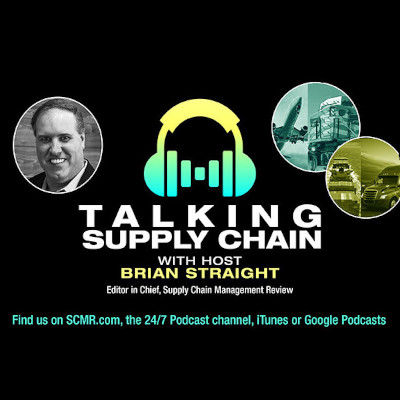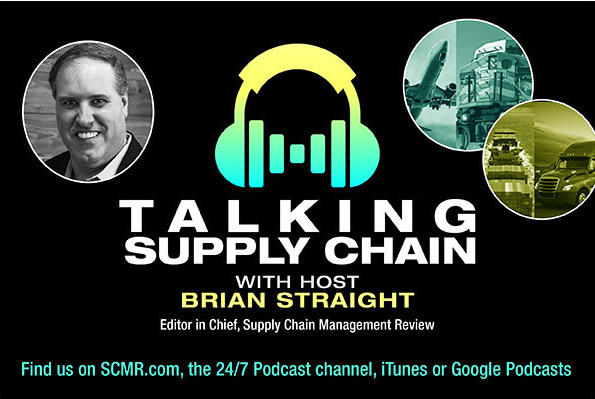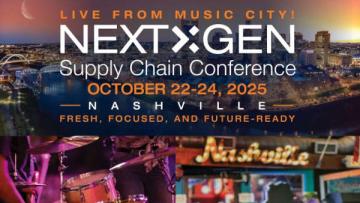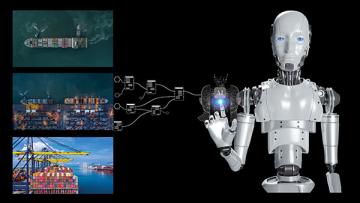Editor’s note: Leadership Lens, appearing online at scmr.com on the second Tuesday of each month, offers insight into leadership issues and how to address them. If you are interested in future topics, you can see a full list of upcoming topics on our Editorial Calendar.
In supply chain and logistics leadership, speed and cost-efficiency often dominate conversations and decisions made on behalf of customers. With technology evolving rapidly—and automation taking center stage, now even more accessible with the integration of artificial intelligence into nearly every system—it’s easy to assume that faster systems and streamlined processes are the final destination in a customer-focused service environment.
The integration of human insights with machine learning and artificial intelligence is becoming essential to leadership in modern logistics. Real-time information is quickly becoming a game of the past, as machine learning enables companies to anticipate complex future scenarios for customers. When tribal knowledge is paired with predictive technology, it opens the door to much more proactive decision-making.
It's important to remember: behind every shipment, every routing decision, and every piece of data are people—people who turn to supply chain providers not just for fulfillment, but for guidance. In my many years of leadership in this industry, it is clear that when it comes to building lasting relationships, people are the differentiator—not just technology or speed.
Believe in your team and let them run with the show
True operational excellence doesn’t come from simply plugging data into a TMS. It comes from human insight—people who understand the nuances of a customer’s freight, their business goals and the complexities that need to be meticulously combed through. When a logistics team knows a customer’s operation well enough to anticipate issues or proactively suggest improvements, you are forming a partnership that expands beyond the basic requirements of a service provider. This is enabled by having a workplace where employees feel connected, respected and are proud of their role. This is something customers themselves will notice.
Those kinds of insights take time, consistency and genuine curiosity. They don’t come from generic dashboards or templated solutions. They come from professionals who are empowered to look beyond the task at hand. It might mean reviewing a contract—even those with competitive providers—and flagging where a customer could negotiate better terms, regardless if it means short-term sacrifice. That kind of integrity builds trust and creates long-term value.
As leaders, we must build a culture that prioritizes deep customer understanding. That means giving employees the time and space to ask smarter questions, pursue better answers, and advocate for what’s best for the customer. When employees feel encouraged and empowered to connect with customers in a personal and professional way, they build relationships rooted in trust. Customers want to do business with people they like, respect, and enjoy working with.
How can technology be a partner for your team and for the customer?
Technology plays a key role in modern logistics management. From TMS platforms to control visibility and data analytics, digital tools can significantly enhance performance and planning. But tools are only as effective as the people using them and the people teaching others to use them well.
The best logistics leaders understand this. Instead of emailing a portal link to a customer and moving on, hoping they are tech-savvy enough to figure it out, they invest in person-to-person training led by their own team. These sessions are conversational, customized and designed to help customers fully understand how to use the technology to its greatest advantage to meet their own personalized needs.
Having the same people who manage the customer relationship deliver the training builds trust and continuity. It accelerates adoption and makes the technology feel like an extension of the customer’s own operation, not just another system to learn; it gives everything we are putting in front of customers a purpose.
Even after onboarding, that support doesn’t go away. Customers want more than dashboards and video tutorials. Customers want experts who can interpret the data and explain what it means for their business. Empower your team to be those experts. It’s not just about the tool—it’s about making sure the customer knows how to use it with confidence and clarity. When employees are confident in their tools and genuinely believe in what they’re teaching, that confidence builds customer trust as well.
The future of service lies at the intersection of technology and industry professionals, each complementing the other to create predictive outcomes that deliver the greatest value to customers.
‘Customer first’ should be obvious and second nature—not a constant reminder
“Customer first” as a phrase shouldn’t be used aimlessly just because every competitor has it on their website and it’s the cliche sales point that everyone has been taught. It should be a reflection of a company’s values, made evident over time through big and small actions and tenured customer relationships. It’s seen in adaptable customer touchpoints, proactive solution proposals, and a willingness to put the customer’s best interest ahead of short-term gains.
A company culture that truly puts customers first should operate with the “customer first” mentality as a foundation to build upwards. It should already be embedded into every business process. That only happens when employees feel valued—not just as professionals, but as people—and when leadership is intentional about nurturing both performance and satisfaction. Because when your team is happy, empowered, and supported, your customers feel that energy too.
Logistics leadership begins there. To serve your customers well, start by serving your team and build an experience that reflects that commitment at every touchpoint.
About the author:
Ryan Keepman is the CEO of Evans Transportation, a leading North American third-party logistics (3PL) provider headquartered in Delafield, Wisconsin, now celebrating 40 years of success. Evans Transportation takes pride in living out its customer-first values through the Evans Experience. Under Keepman’s leadership, Evans has become one of the fastest-growing companies in the industry. Since joining the company in 2007, Keepman has steadily advanced in leadership roles, leveraging his deep industry experience to drive continued innovation and exceptional client service. His commitment to both the industry and Evans’ Wisconsin roots earned him recognition as a C-Suite Top Executive by the Milwaukee Business Journal for his outstanding leadership and contributions to the Milwaukee business community. A graduate of the University of Wisconsin–Madison, Keepman now lives in Florida with his wife and three children, where he enjoys golfing and spending time on the coast.
SC
MR


More Supply Chain Management
- From flight decks to fulfillment: A veteran’s supply chain journey
- Trust the team, win the customer
- 6 Questions With … Sue Williams
- The Strategy-Driven Supply Chain Lab: A 5-step guide to cultivate strategic thinking about your supply chain
- Better AI does not always mean bigger
- More Supply Chain Management
What's Related in Supply Chain Management

 Explore
Explore
Topics
Business Management News
- C.H. Robinson rolls out AI agent to address LTL classification overhaul
- Danone latest to announce new US investment
- From flight decks to fulfillment: A veteran’s supply chain journey
- Employee versus enterprise AI adoption
- Uber Freight’s Val Marchevsky to deliver Keynote at NextGen Supply Chain Conference
- Unlocking the green grid: Innovations for eco-friendly last mile
- More Business Management
Latest Business Management Resources

Subscribe

Supply Chain Management Review delivers the best industry content.

Editors’ Picks





